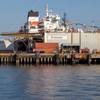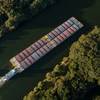Sewol Crew Gets Little in Legal Resources
MOKPO, South Korea, May 20 (Reuters) - South Korea's legal system appears to be failing 15 surviving crew of a ferry that sank last month, killing hundreds of children, with their being tried and convicted by an angry public before the case has even come to court.
Lawyers are agonising over how they can mount a convincing defence of the crew, who jumped ship as the children waited in their cabins, dressed in life jackets, obediently following orders before a disaster that put the whole country in mourning.
The absence of determined defence may mean that the crew's side of the story - whether, for instance, they were adequately trained or whether they were given strict orders to abandon ship - may never be heard in court.
One lawyer, appearing for the one of the crew in hearings held behind closed doors to decide the validity of arrest warrants, confessed to being torn between professional obligation and the resignation that lawyers could not make any difference amid a nationwide witch hunt.
"It is a burden for every lawyer, because the crime is something that can hardly be forgiven," he said in the small coastal town of Mokpo.
"It's not just that one person died. There were hundreds. All I could say to the judges is 'we will await your wise decision'. That was it."
Cheong Yeong-seok, a law professor at Korea Maritime and Ocean University, said the "harsh public criticism" meant the chance of a spirited defence was low.
"For lawyers, this case is difficult," he said. "...There is almost nothing to defend because the crew jumped ship without doing their duty."
The Sewol, overloaded and travelling too fast on a turn, sank off the southwest coast on a routine journey from Incheon on the mainland to the southern holiday island of Jeju, killing children and teachers, among others, on a high school field trip.
Only 172 people were rescued of an estimated 476 passengers and crew on board.
Appointed by the court, about half the 20 lawyers in Mokpo had to appear for the crew in the closed-doors hearings, said lawyers and sources with direct knowledge of the process.
But the lack of enthusiasm was such that the court had to plead for help, they said.
The lawyers, more used to minor business and electoral disputes and petty crimes in a town famous for its octopus, mostly work cheek by jowl in tiny offices in just two buildings.
They have to lower their voices, heavily accented with a rural southwestern brogue, to avoid the competition overhearing. Law firm officials said this case was too big and too much trouble.
TEARS ROLL DOWN PRESIDENT'S CHEEKS
The ferry's captain and three senior crew were charged with homicide last week, two were charged with fleeing and abandoning ship and nine were charged with negligence.
The tragedy turned from an outpouring of grief into public anger as video footage showed some of the crew, including the 69-year-old captain in his underpants, escape the sinking vessel while the children were still on board.
President Park Geun-hye, tears rolling down her cheeks, formally apologised on Monday for the disaster and said she would break up the coast guard because it had failed in its rescue mission.
Until now, the state-appointed lawyers in Mokpo had been bound to represent the detained crew, speaking to them briefly before the court hearings.
But now charges have been laid, the trial will move to the bigger town of Gwangju. The Mokpo court is too small.
Gwangju District Court said the crew's lawyers had been replaced by six new state-appointed attorneys based in the town, and private lawyers for two crewmen.
"The state-appointed lawyers are different from private lawyers. Realistically, they have little confidential relationship with their clients," a source close to the legal profession said.
"When the court calls and assigns this case to lawyers, it is pressure and doesn't feel good. But the defendants should have the right to defence. Even more so because there aren't many precedents for such a case," another source said.
The lawyer and sources declined to be named due to the legal proceedings and the controversial nature of the case.
In the 1995 collapse of a Seoul department store that killed 502 people, the head of the company that built the store was unable to find a private lawyer to represent him, media said. He had to get court-appointed counsel.
South Korea is still furious about an accident that could so easily have been avoided, with footage emerging of the children playing and joking about the Titanic as the ship started to list.
Two children's bodies were found days later with their life jackets tied together, presumably so they wouldn't drift apart.
There is a Korean saying that the law of emotion is above the law of the land and Shin Kwang-yeong, a sociology professor at Chung-Ang University in Seoul, said the "spirit of the law" in this case had likely been damaged by public anger.
"Media affects public opinion, then public opinion affects investigations and legal proceedings," he said.
Angered by his daughter's death, Yoo Kyeong-geun called for maximum penalties to be imposed on the crew.
The maximum penalty for homicide is death, for abandoning ship, life in prison, and for negligence, lengthy jail terms.
"It is clearly homicide, so we don't have to go through prosecution and defence," Yoo said. "I think the heaviest punishment is one way to prevent other people from being so irresponsible."
(By Ju-min Park, Reporting by Ju-min Park; Editing by Nick Macfie)













